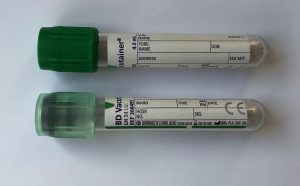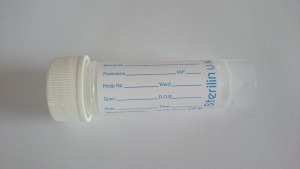Lithium Heparin plasma or plain urine
CSF for specific investigations


With any investigation it is important to collect the correct sample at the correct time to gain as much useful information as possible. The following is a brief guide to help with this goal.
The most appropriate test for the investigation of suspected primary amino acid disorder is quantitation of plasma amino acids.
Plasma amino acids should be collected, as far as possible, on samples taken when the patient is symptomatic. Dietary restrictions may cause characteristic patterns to disappear and result in false negative results.
Plasma amino acids fluctuate depending on protein intake and whether the patient is in a fed or fasted state. Samples taken in the non-acute setting e.g. outpatients should ideally be fasting (at least 6 hours), otherwise they should be taken just before feeding.
Urine amino acid analysis (preferably a fasting early morning sample) should ONLY be requested if a transport defect is suspected (e.g. cystinuria or Hartnup disease) or where assessment of proximal renal tubular function is required. In addition a urine sample is needed for the measurement of phosphoethanolamine where hypophosphatasia is suspected (skeletal problems with a low alkaline phosphatase activity).
To ensure analytical and interpretataive quality urine samples that are very dilute (creatinine < 1 mmol) will not be analysed.
For the investigation of epileptic encephalopathy a paired plasma sample must accompany any CSF.
Dr Paul Cook MBBS MSc MRCP PhD FRCPath
Consultant in Chemical Pathology and Metabolic Medicine
University Hospital Southampton NHS Foundation Trust
Detection of IEM
21 days
Referred test
Can be added on to an existing request up to 4 days following sample receipt
Assayed by the Chemical Pathology Dept. General Hospital, Southampton.Tel 023 80 96709